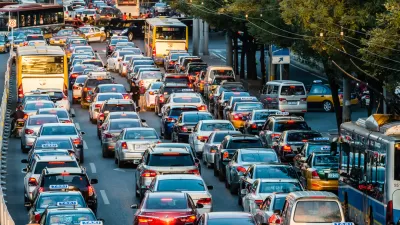Reporting from the world's most polluted capital, Julie McCarthy speaks with Ari Shapiro on NPR's "All Things Considered." McCarthy talks glowingly about how successful the two-week trial went in reducing pollution and congestion even more so.
Julie McCarthy, NPR's international correspondent based in New Delhi, India, clarifies that the air pollution mitigation data from the trial program is not consistent, with some reports indicating the pollution reduction was as low as 10 percent, and others as high as 40 percent. But what does seem clear is that congestion was reduced.
(T)his was the no. 1 topic of conversation in the public. They were very engaged in this, and congestion was noticeably down and it was a pleasure driving around. The trips were faster, there were fewer cars, there was less idling in the car. [Listen here.]
"I have never heard anyone say driving in New Delhi is a pleasure," quips Ari Shapiro, host of "All Things Considered."
"Well, it was because you had a sense of space on the roads," responds McCarthy. "Normally, you simply don't have that and there's a lot of time in traffic jams. You inch along in Delhi. That wasn't the case this time."
"If the program seemed so successful, why is the government putting it on hold until May or June?" asks Shapiro.
Turns out there are important issues that need to be considered, e.g. "tweaking exemptions" that include women and motorcycles, which "make up 60 percent or more of registered vehicles in this city." And planners "want to discourage people from gaming the system by buying a second car. They actually do that," states McCarthy.
However, she clarifies that it also has to do with the nature of government there.
(T)here's not the sense of urgency in Delhi that you find in, say, Beijing. You know, even though Delhi is more polluted according to the World Health Organization, there's been an apathy here and a slowness to grasp the magnitude of the health problem.
For example, McCarthy notes that one reason for halting the program was that "local politicians don't want to disrupt this all-important exam season which takes place in March and April. They want these kiddies to be able to be taken to school and back any day of the week by their parents."
One good sign is the recognition of how much the congestion reduction was appreciated, consequently "the environmentalists want to see a congestion tax [or congestion charge]," states McCarthy.
It worked to great effect in London - where you were simply charged to come into the center of the city [known as a cordon charge.] The city's going to need to regulate sources of pollution other than cars, other than vehicles, like the coal-burning plants that power this city.
China announced in 2014 that it will ban coal burning in the Beijing region by 2020. "And yet India intends to triple its production of coal by 2030," wrote McCarthy in an NPR article last November ahead of the Paris Climate talks.
FULL STORY: Indian Capital Suspends Odd-Even Car Experiment To Curb Pollution

Study: Maui’s Plan to Convert Vacation Rentals to Long-Term Housing Could Cause Nearly $1 Billion Economic Loss
The plan would reduce visitor accommodation by 25% resulting in 1,900 jobs lost.

Alabama: Trump Terminates Settlements for Black Communities Harmed By Raw Sewage
Trump deemed the landmark civil rights agreement “illegal DEI and environmental justice policy.”

Why Should We Subsidize Public Transportation?
Many public transit agencies face financial stress due to rising costs, declining fare revenue, and declining subsidies. Transit advocates must provide a strong business case for increasing public transit funding.

Paris Bike Boom Leads to Steep Drop in Air Pollution
The French city’s air quality has improved dramatically in the past 20 years, coinciding with a growth in cycling.

Why Housing Costs More to Build in California Than in Texas
Hard costs like labor and materials combined with ‘soft’ costs such as permitting make building in the San Francisco Bay Area almost three times as costly as in Texas cities.

San Diego County Sees a Rise in Urban Coyotes
San Diego County experiences a rise in urban coyotes, as sightings become prevalent throughout its urban neighbourhoods and surrounding areas.
Urban Design for Planners 1: Software Tools
This six-course series explores essential urban design concepts using open source software and equips planners with the tools they need to participate fully in the urban design process.
Planning for Universal Design
Learn the tools for implementing Universal Design in planning regulations.
Smith Gee Studio
Alamo Area Metropolitan Planning Organization
City of Santa Clarita
Institute for Housing and Urban Development Studies (IHS)
City of Grandview
Harvard GSD Executive Education
Toledo-Lucas County Plan Commissions
Salt Lake City
NYU Wagner Graduate School of Public Service



























